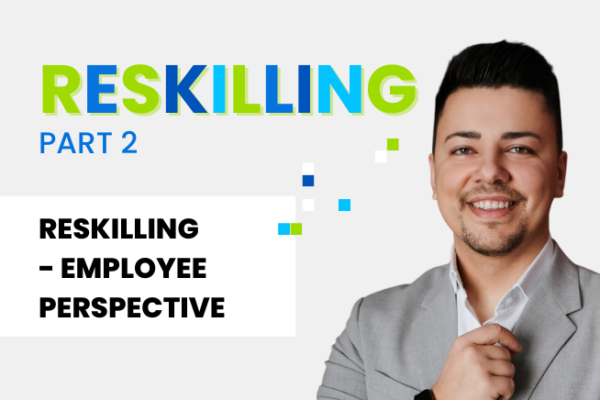Why do HR directors claim that employees are not willing and ready to invest their time in reskilling when approximately 375 million people worldwide will need to reskill and acquire new skills by 2030 (McKinsey)?
WATCH THE WEBINAR (PL): Reskilling - how to plan and implement a strategy to engage and effectively reskill employees.
It may seem like that date is distant, and changes related to reskilling and automation may not reach Poland or personally affect them. I myself experienced automation and robotics in my previous job at a large corporation, where artificial intelligence started handling some of my clients. The application was able to offer better deals for customers. It was a signal for me that it's worth thinking about development and not staying in one place - commented Adrian Siemieniak.
A good example is Amazon. Over 7 years, from 2015, the warehouse packing robot increased its productivity from 30 packages per hour to 1000 pieces. That's over thirtyfold growth!
Employees will likely feel even more pressure, so it's important to offer them the opportunity to reskill. Amazon was one of the first companies to appreciate reskilling and upskilling. They are aware that it is an incredibly effective tool that helps both companies and employees reach higher potential. They don't wait for regulations, which are naturally lacking; they develop solutions on their own. They stay ahead of the system - added A. Siemieniak.
Employee in a dilemma, seemingly ready but not engaged.
Since the beginning of this year, with the buzz surrounding artificial intelligence and ChatGPT, many employees are showing an increased desire to accelerate their development and invest in their skills.
It's worth emphasizing the BCG study, which indicates that as many as 68% of employees in Poland are ready and willing to reskill. Another important factor is professional development, the second most significant motivational factor after compensation.
However, according to Gallup's study, Poland ranks 25th in employee engagement, with only 14% of surveyed employees being engaged, leading to the phenomenon of "quiet quitting" that has recently reached Poland as well.
"Quiet quitting" refers to situations where employees decide to leave their jobs not due to negative employment conditions or lack of job satisfaction but because of the lack of opportunities for growth and advancement, leading them to resign and seek new opportunities and challenges.
It's essential for us to extend a helping hand to these employees because there's a high probability they will leave the company if we don't react in a timely manner. According to Deloitte, 93% of Polish employees who plan to leave within 6 months cite the lack of development opportunities as the main reason - A. Siemieniak adds.
How can we help them?
Companies that are implementing strategies or looking for ways to improve reskilling processes and employee development focus on key elements such as communication and transparency. Employees should know where the organization is heading, what the goals are, and why changes are happening. This will allow them to engage more in their development and contribute to the overall organizational growth.
Another critical factor in the success of reskilling employees is an individualized approach and providing flexible, personalized learning paths. However, it's not just about offering training programs; managers' openness and engagement in the reskilling process are equally important.
We can create an excellent training program, invest in developing employees' skills, but if we don't provide opportunities for them to take on new roles within our company, there's a high probability that those employees we've encouraged and trained will leave for a competitor who offers such practices. Managers must be aware that reskilling is an investment in the company's future and its human resources. They need to be open to change, ready to adjust the organizational structure, and create positions for employees who acquire new skills. It's also essential to provide a clear career development path so that employees know what advancement and development opportunities they have - suggests A. Siemieniak.
A good example is the actions taken by Future Collars, a school that places great importance on mapping employees' competencies before starting the training process. The school provides an original IT Talent Profile test to assess employees' digital technology abilities and skills. Through discussions with career advisors, motivation and passion of employees are analyzed to ensure that the decision to switch to the IT industry is appropriate and well thought out.
To maintain high motivation during the course, the school offers practical projects and tasks that allow participants to apply their newly acquired knowledge directly. Live lessons are also organized to build a community of participants, enabling them to share experiences and support each other. Additionally, participants have individual consultations with mentors.
97% of participants complete our training and receive certification. We are proud of this result as it demonstrates the effectiveness of our approach. Mapping competencies, adapting training programs to individual needs, and maintaining high motivation are key to the success of the reskilling process. Employees who are properly equipped and supported in their development have a better chance of achieving their goals and embarking on new career paths in the digital technology field - concludes A. Siemieniak.
Read more:
Part 1 - The strategic role of reskilling.
Part 3 - How to implement reskilling in the organization.
***
This article is based on the webinar "Competence Development and Reskilling - Key to Success in a Dynamic Business World" organized by Future Collars. The webinar featured experts: Tina Sobocińska, Joanna Pruszyńska-Witkowska, and Adrian Siemieniak.
***
Tina Sobocińska - an experienced HR leader with over 20 years of experience both in large corporations and as an advisor. For the past 2 years, she has focused on reskilling and upskilling trends. Her expertise includes advising on hybrid work implementation, defining future competencies, and collaborating with Future Collars on reskilling initiatives. Tina is also a respected lecturer at SWPS postgraduate studies and teaches at SGH and the Leon Koźmiński Academy. She engages in recording podcasts and conducting interviews with leaders to prepare companies for challenging times.
Joanna Pruszyńska-Witkowska - Co-founder of Future Collars - a digital competence school. She has over 20 years of experience in running public relations agencies. Always interested in empowering women, the idea of helping women prepare for technological changes and providing them with new opportunities in the IT sector was born. This vision led to the creation of Future Collars, which currently has 60% to 67% female graduates, examples of completely changing their careers and entering the IT world, regardless of age, previous experience, or education.
Adrian Siemieniak - Business Development Manager at Future Collars. He advises companies that want to thrive in the world of new technologies by equipping their employees with essential digital competencies.
***
Future Collars is a leading digital competence school specializing in reskilling and upskilling employees. The school offers online courses in programming and software testing, providing practical skills and job placement support.
More information about Future Collars' offerings can be found on their website: https://futurecollars.com/en









